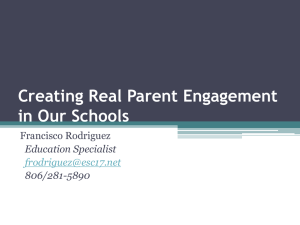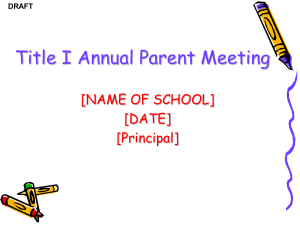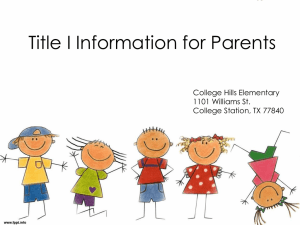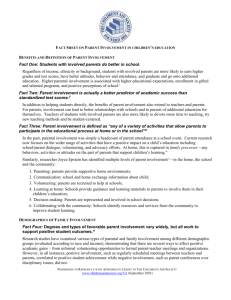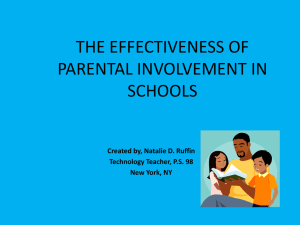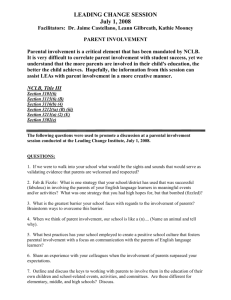Circular 24/91 - Parents As Partners In Education (File Format Word
advertisement
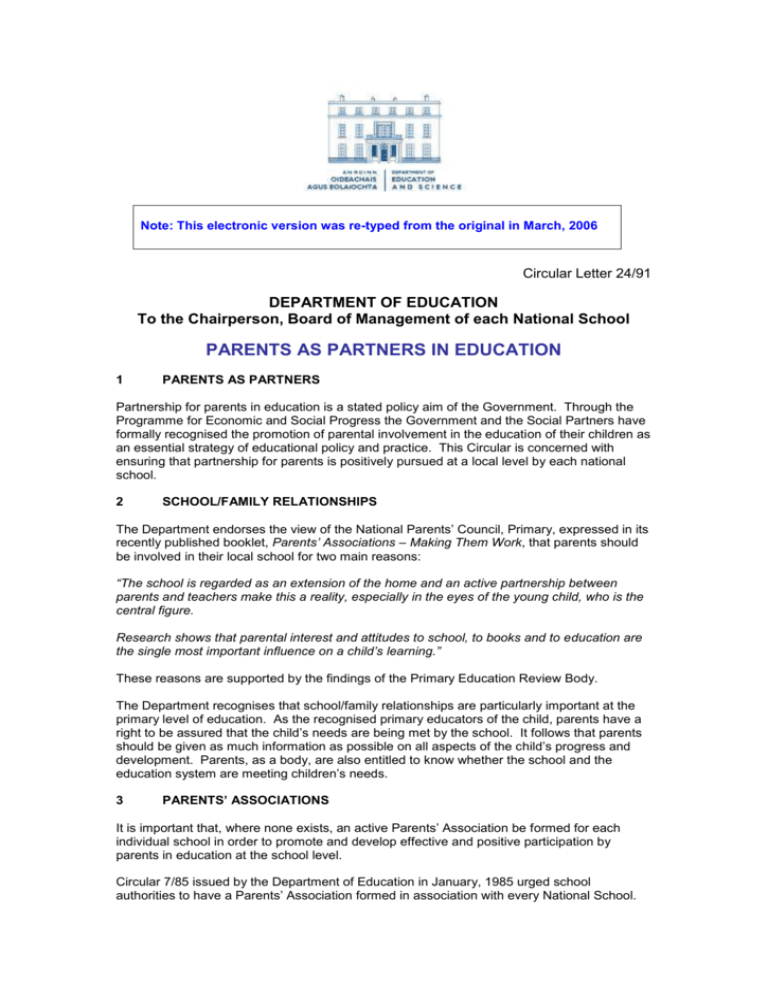
Note: This electronic version was re-typed from the original in March, 2006 Circular Letter 24/91 DEPARTMENT OF EDUCATION To the Chairperson, Board of Management of each National School PARENTS AS PARTNERS IN EDUCATION 1 PARENTS AS PARTNERS Partnership for parents in education is a stated policy aim of the Government. Through the Programme for Economic and Social Progress the Government and the Social Partners have formally recognised the promotion of parental involvement in the education of their children as an essential strategy of educational policy and practice. This Circular is concerned with ensuring that partnership for parents is positively pursued at a local level by each national school. 2 SCHOOL/FAMILY RELATIONSHIPS The Department endorses the view of the National Parents’ Council, Primary, expressed in its recently published booklet, Parents’ Associations – Making Them Work, that parents should be involved in their local school for two main reasons: “The school is regarded as an extension of the home and an active partnership between parents and teachers make this a reality, especially in the eyes of the young child, who is the central figure. Research shows that parental interest and attitudes to school, to books and to education are the single most important influence on a child’s learning.” These reasons are supported by the findings of the Primary Education Review Body. The Department recognises that school/family relationships are particularly important at the primary level of education. As the recognised primary educators of the child, parents have a right to be assured that the child’s needs are being met by the school. It follows that parents should be given as much information as possible on all aspects of the child’s progress and development. Parents, as a body, are also entitled to know whether the school and the education system are meeting children’s needs. 3 PARENTS’ ASSOCIATIONS It is important that, where none exists, an active Parents’ Association be formed for each individual school in order to promote and develop effective and positive participation by parents in education at the school level. Circular 7/85 issued by the Department of Education in January, 1985 urged school authorities to have a Parents’ Association formed in association with every National School. While much progress has been made since then, there are still national schools which do not have a Parents’ Association. The Department sees a Parents’ Association as essential for: developing partnership for parents in education at the level of the local school, and supporting and encouraging individual parents to become more involved in the education of their children. The Minister for Education now requests each Board of Management to take whatever steps are necessary to ensure that a Parents’ Association is formed in association with its school. The Board should actively promote all means of effective co-operation between the school and the Parents’ Association. 4 FORMING A PARENTS’ ASSOCIATION As a first step, the Board should call a general meeting of parents for the purpose of the parents forming a Parents’ Association where one does not already exist. It would be desirable that the Board arrange with the National Parents’ Council-Primary to have a representative present to advise the parents. The Booklet entitled Parents’ Associations – Making them Work will be of particular assistance to schools in promoting parental involvement. A copy is being sent to the Chairperson of each Board for this purpose. Further copies may be purchased from the National Parents’ Council, 16-20 Cumberland Street South, Dublin 2 (01-6789980), price £2.00. It is in the best interests of the school that positive and effective communication exists between the Parents’ representatives on the Board and the Parents’ Association. To this end, parent representatives should be ex-officio members of the Parents’ Association Committee. 5. DEVELOPING PARTNERSHIP WITH PARENTS Further developments will be necessary in order to bring about genuine partnership at school level. Each national school will be required to establish as part of its overall school policy/plan, a clearly defined policy for productive parental involvement. The Department in consultation with the partners in education will draw up guidelines for this process. The guidelines will take account of the recommendations of the Primary Education Review Body on relations between parents and boards of management and teachers, which, in general, the Department accepts. In conjunction with the guidelines, the Department will prepare an information booklet for parents on the educational provision being made for their children and on the operation of the national school system. 6 NATIONAL PARENTS’ COUNCIL Each Parents’ Association should strongly consider affiliating to the National Parents’ Council, Primary Tier. Such affiliation affords parents the opportunity and the mechanism for having a voice in decision making on primary educational issues at a national level. The National Parents’ Council provides representation for parents, as partners in education, on various Government-appointed educational bodies. Through its representative function, the Council is making a distinctive and valuable contribution to central planning and policy development in education. C.N. LINDSAY, SECRETARY. MAY, 1991.


